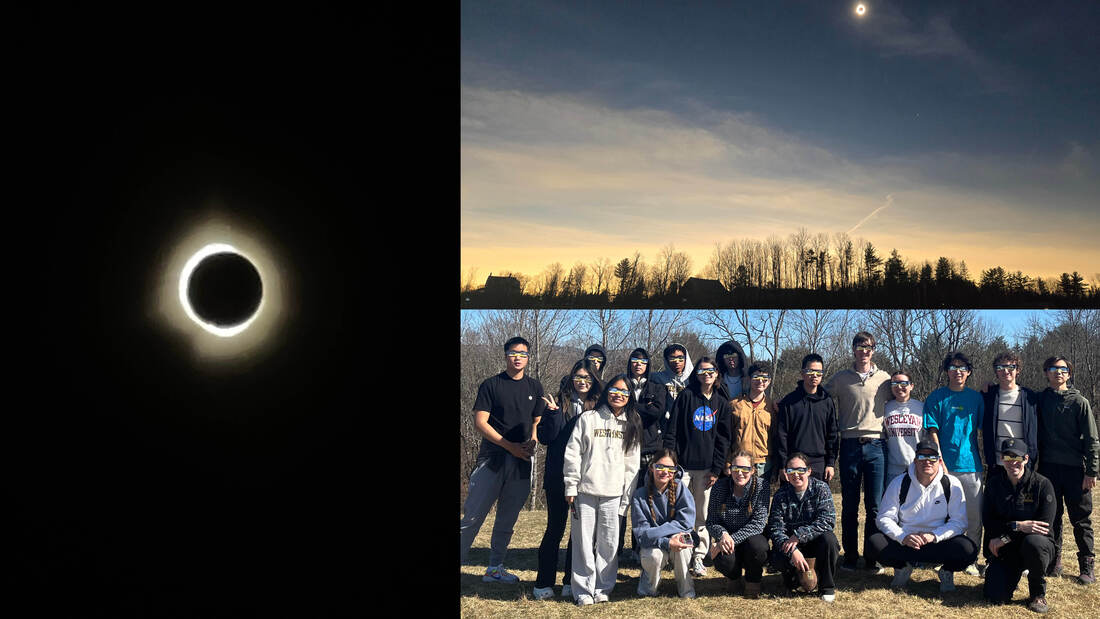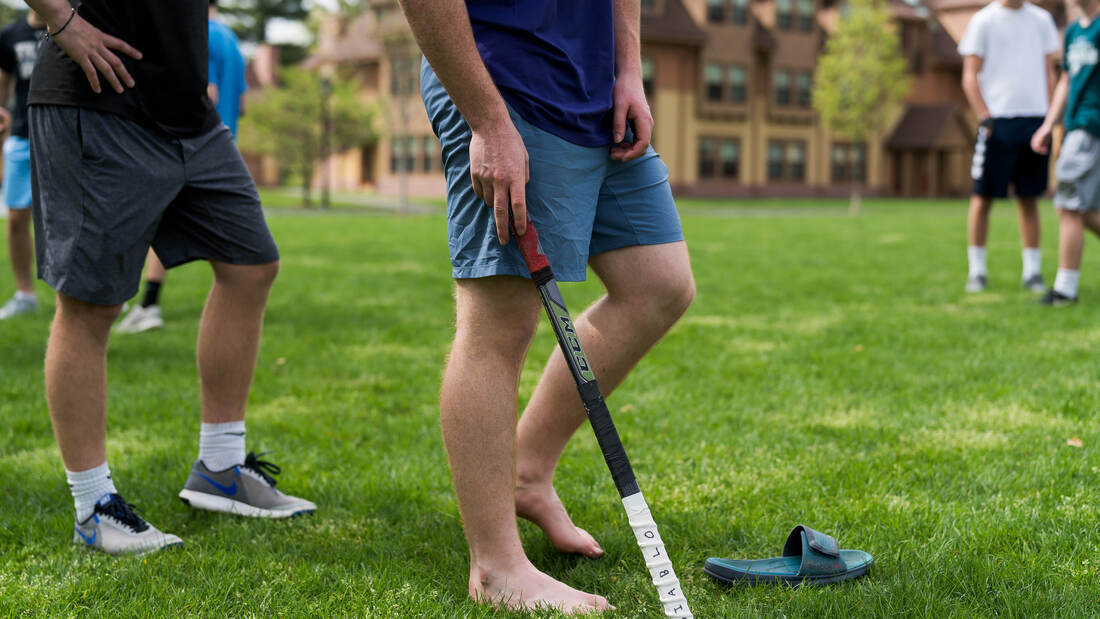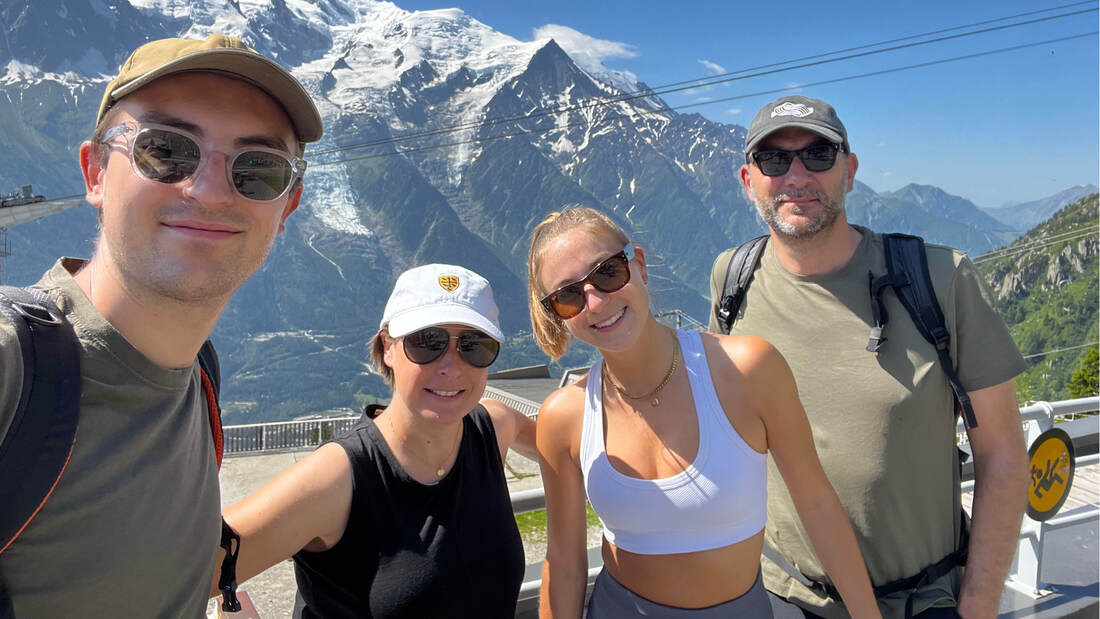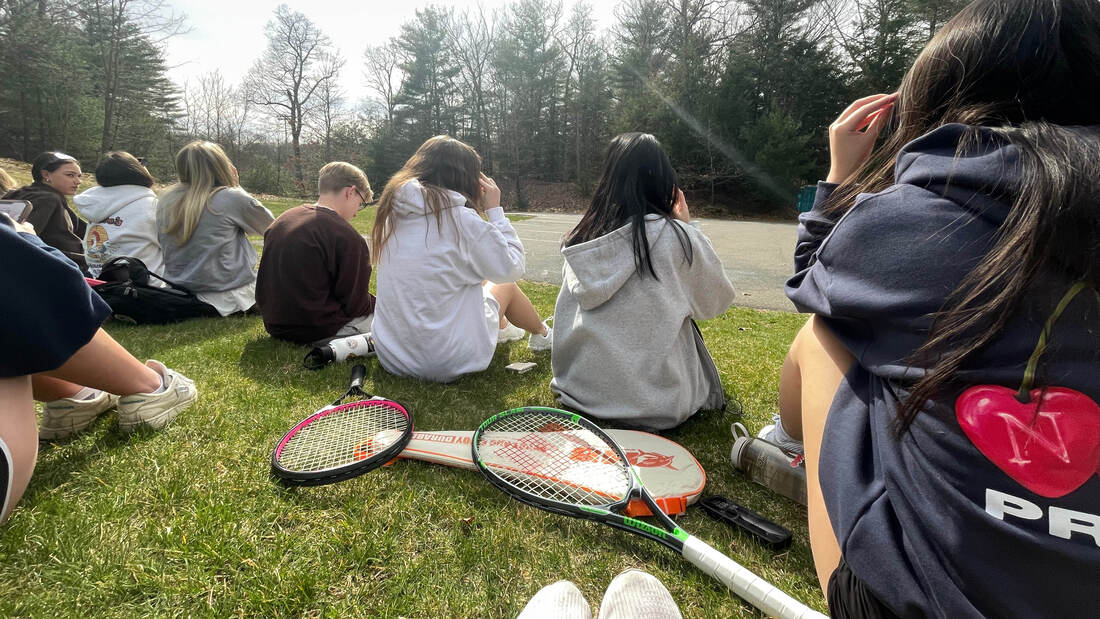By Kimi Weng ’24Photos below: on the left by Carolyn Cheng, top photo at right by Mr. Leary and bottom right by Mr. Van Dolah. We see the sun and the moon almost every single day, and they are the symbols of day and night, respectively. But did you know that the sun and moon can appear at the same time at the same location?
A solar eclipse happens when the moon passes between the sun and the Earth and blocks the sun from the perspective of the Earth. There are two main types of solar eclipses: a partial solar eclipse and a total solar eclipse. A partial solar eclipse, as its name suggests, is when a part of the sun is covered by the moon. On the other hand, a total solar eclipse is when the entire sun is covered by the moon and is accompanied by sunset effects and brief darkness. Although a total solar eclipse is not a super rare occurrence, you will only be able to see a total eclipse at the same location once in your lifetime. Recently, a solar eclipse occurred in North America, and fortunately, the path of total solar eclipse, or totality, also crossed the contiguous United States. According to NASA, the next time we will be seeing a total solar eclipse in the contiguous United States will be in 2044. As the totality was expected to pass through the United States, lots of people who were near the path wanted to take a glimpse of this spectacular phenomenon. And of course, Westminster will not miss this chance either. On April 8, 2024, a group of Westminster faculty took a group of students on a trip to St. Johnsbury, Vermont to watch the total solar eclipse. As I am currently returning from the trip at 10 p.m. on a Monday, past check-in, I decided that this is the perfect topic for a newspaper article. But before I get started, I want to give a huge thanks to the excellent planning of Mr. Leary, Mr. Van Dolah, Mrs. Urner-Berry, and Mrs. Keough; because of them, 22 students were able to embark on this once-in-a-lifetime trip to witness the total solar eclipse. At 7:45 a.m., the air was filled with excitement as two buses departed the Westminster campus under a clear sky. However, we encountered somewhat severe traffic from the “solar eclipse rush” and road construction. Together with two pit stops for bathroom and lunch (a random couple came up to us during one of the pit stops and gave us three Moonpies), the road trip there was almost seven hours. We arrived at St. Johnsbury, Vermont at around 2:30 p.m. Under the instructions of Mr. Leary, we assembled the binoculars and tripods with solar filters. After he handed special filter glasses to each one of us, we started observing the sun and noticed that the lower right section of the sun was already covered by the moon. The solar eclipse had begun. As more of the sun was covered by the moon, we noticed that the temperature was decreasing and the surroundings were slowly getting darker. We also did a fun little experiment where we made small holes with our fingers and observed the shadows. Due to the special shape of the sun, the small opening of our hands allowed light to pass through and form a small crescent in the shadow. At around 3:30 p.m., the moment that everyone had been waiting for arrived. We saw sunset effects in all directions and the sky turned dark. A total solar eclipse was happening. The moon completely covered the sun. A ring of glare quietly sat in the sky. The sun’s corona, the outer atmosphere, revealed itself in front of us. Since the sun was fully covered by the moon, everyone took off their filter glasses and enjoyed the magnificent phenomenon. The total solar eclipse lasted about two to three minutes, but the most surreal experience came after totality, as the sun was unveiled. The sky turned bright again, but it was nothing like a normal sunrise. The light that initially shone on Earth was so concentrated that we felt as if we were under stage lights. The grass that we were standing on, the mountains behind us, and the entire world felt artificial because our brains were so used to the normal conception of day and night. Roughly 10 minutes after the totality, the sky returned to its normal brightness, and it marked the end of the climax of this trip. After moments of sharing our excitement, we were on the road and ready to leave at 4:30 p.m. However, the fun part of this trip didn’t end there. I would also like to highlight the bus ride back to campus, as it was also a memorable experience. Due to the continuation of the traffic caused by the solar eclipse, we did various things on the bus to kill time, including reading, watching movies, singing karaoke, passing snacks across the toaster, and sharing our longest travel experiences (not knowing that this would become one of them). We also stopped at a plaza in Vermont to get dinner, and this is when it started to get interesting. Some of my friends and I couldn’t resist the lure of Five Guys and decided to wait in a relatively long line for some burgers. What we didn’t know was that we would be spending the next hour in Five Guys, holding everyone else on the bus back. It was the busiest Five Guys I have ever seen in my life. There were so many milkshakes ordered that the person making them was losing his voice from yelling numbers. He shouted, “The spinner in the milkshake machine is not spinning anymore.” Eventually, we got our burgers. The rest of the road trip happened in the dark. Everyone was tired, but the March Madness game between UConn and Purdue kept us excited. We returned to campus at 11:45 p.m., slightly later than we originally planned due to the unexpected traffic. The commitment of Mr. Van Dolah and Mrs. Urner-Berry driving for the entirety of this trip is truly impressive, and this trip wouldn’t have happened without them. After approximately 13 hours of being in a toaster, I think this field trip might have broken the record for most time spent in a Westy toaster in a day. Even though the time spent on the road seemed daunting, if I were asked to go see the total solar eclipse again, it would be a yes without any second thought. Witnessing a total solar eclipse is truly an amazing event that you will remember for the rest of your life. https://science.nasa.gov/eclipses/future-eclipses/eclipse-2024/what-to-expect/ https://science.nasa.gov/eclipses/types/
0 Comments
By Margee Mahoney ’242024. Our civilization has never been more developed; we are integrating Artificial Intelligence into our daily lives with ever more information at our fingertips. Humans are stronger, faster, and smarter than ever before. Yet, millions, more than 28 million, according to Vanity Fair, are hopelessly ensnared in the simple pleasure (or overwhelming frustration) of the New York Times games.
It started with Wordle’s exponential growth in popularity, which provided pandemic-ridden citizens with a sense of normalcy, routine, and connection. “Did you get the Wordle today?” became a much-needed conversation starter for many whose social skills were inadequate after months of isolation. The addiction to the New York Times’s perfectly challenging yet doable game quickly spread to the Mini and, in 2023, Connections. Similar to Wordle, the Mini is equally challenging yet doable. It’s the perfect bite-sized activity for crossword lovers, with options to tailor the difficulty to the player's liking, such as enabling auto-check. Players can race against each other, hoping to beat their personal record (mine is 23 seconds) or one of their peers. These two games provide a wonderful start to one’s morning or a perfect unwinding activity in the evening, an opportunity to challenge your mind and connect with friends. Speaking of connecting, one New York Times game seems completely obvious yet incredibly confusing: Connections. The perfect storm, Connections is both incredibly satisfying and intensely infuriating. There is no in-between; you will either complete connections in less than a minute or wish to throw your phone across the room. As @apoclpsestudent on Twitter pointed out, “NYT Connections is bold enough to say, ‘If these words were different words, they would be related.’” An incredibly true and illogical observation: the simple challenges of the Mini and Wordle are nothing compared to the insurmountable trial of a difficult connection group. But, sadly, it is too late for the millions of participants who look forward to the NYT games each morning or evening. We are trapped in an endless cycle of challenges, satisfaction, and perhaps sometimes rage, and I look forward to it every day. By Chip Genung ’25Photo by Yoon Byun Stickball, a time-honored Westminster tradition dating back to the school's founding in 1888. It has changed throughout the years, but the premise has stayed the same. Still, despite almost a century and a half of this tradition, last year was a subpar year for the sport with only a few games being played and a low community involvement in the activity. On top of that, with the unfortunate departure of Ms. Kennedy, we have lost our commissioner.
But this year, Westminster has the opportunity to bring Stickball back and make it better than ever. Tyler Arsenault, the gym instructor, is the new commissioner and is excited to lead Westy into a great season. I had the chance to sit down and talk with him about his plans for Stickball. At the end of last year, Tyler was asked by Ms. Kennedy to be the new commissioner, and he enthusiastically responded yes. He was “excited and delighted to take part in such a fun community event,” and he already had some ideas. One of these ideas is to have all the games on the same one or two days of the week to make it easier and more fun for more students to get involved, as he said, “the more people, the better it will be.” He is also striving to instill more communication not only between himself and the students but also between the students and other students in their halls. Tyler and the entire community are very excited to see what is in store for Stickball this year, and it seems that this will be the best year yet. By Camilla Norton ’25Below, Madame Ariane Barrillon with her family. Photo courtesy of Madame Barrillon. For the past eight years, Madame Ariane Barrillon has been a consistently positive member of the Westminster community. As a teacher, an advisor, and the overseer to the Martlet Francais, Madame Barrillon has contributed greatly to our community.
Although Madame Barrillon has always loved teaching and being a teacher, what drew her to Westminster was her “dream to teach French in the United States” and to share her culture as well as her love for teaching her native language. Additionally, she admired that Westminster was an independent school because it meant smaller class sizes, which would allow her to get to know students more personally and to understand and read them better. While teaching here, Madame Barrillon has had many highlights and positive experiences. Specifically, she enjoyed getting to know her students in class and during advisory. Consistently having an advisory of only four members has allowed her to form close connections with her advisees. She admired being able to watch the progress and growth of so many of her students over the years and looks forward to seeing and hearing about what they have done within and soon beyond Westminster. Although feeling bittersweet about departing, she is excited to “start a new adventure, discover a new place, and make new friends.” While reflecting on her Westminster career, she mentions that “30 years ago, I would never have expected to be teaching at this level, and I want to thank the support I got here. I've positively evolved so much in terms of my personal growth and teaching confidence because of the support I got from everyone, including the administration, colleagues, and students.” She urges current Westminster community members to “never give up” since she never expected herself “to get to a level full of so many opportunities and so much support” that has come from her time at Westminster. By Chip Genung ’25Third-party presidential bids are common but never successful. Some of the closest attempts at winning the White House include former President Theodore Roosevelt with his Bull Moose Party run in 1912, with 27 percent of the popular vote, and Ross Perot, who won 19 percent of the vote in 1992. But no third-party candidate has reached nearly those numbers in the 21st century, even with the Libertarian and Green parties always running candidates, who, combined, often won less than 5 percent of the vote. Still, Robert F. Kennedy Jr. thinks he has a chance at it.
Kennedy is the nephew of the 35th President, John F. Kennedy, and son of former attorney general and presidential candidate Robert F. Kennedy. Surrounded by politics virtually his entire life, he decided to continue the family trend of public service by working as an environmental and children’s rights lawyer. Through his work, he has taken up environmental cases against major companies and organizations, and he managed to win many. Initially, he ran for the 2024 Democratic bid for president, but, after seeing no path to victory against President Biden for the nomination, he launched an independent bid for the White House. Though polls vary, RFK is currently polling somewhere around 13 percent, which is impressive given the current political climate. This is, in part, thanks to his name Kennedy, which he has utilized greatly and is his best hope of making real progress. Given the domination the Kennedys had over the Democratic Party and American politics at large in the late 20th century, it is no surprise that RFK is utilizing the name and finding success with it. While Kennedy likely has no path to victory, he still is a player in this election. This is because he raises the question of whether he will take more votes from Trump or Biden? Biden might be the obvious answer, given Kennedy’s only recent departure from the Democratic Party, and the fact that the name Kennedy holds weight to far more Democrats than Republicans. However, this is not necessarily the case once one looks at his policies. His beliefs on health care, specifically vaccines and the federal reaction to the COVID-19 pandemic, are very attractive to conservatives. He has also taken a stand for securing the southern border more to lower illegal immigration, while supporting the expansion of systems to increase legal immigration. These policies, coupled with his environmental stance and his family's prominence in the DNC, make him a viable contender to attract both Republicans and Democrats, and he will continue for the foreseeable future to take voters from both sides, considering his ample funding. This is, in part, thanks to his new vice president pick, philanthropist and lawyer Nicole Shanahan, who is also the ex-wife of a Google co-founder. This has not only given Kennedy enough capital to continue his campaign but has made the ticket appealing to more demographics since Shanahan is 38 (young for politics) and is the daughter of a single immigrant parent. Ultimately, we probably won’t see another Kennedy in the White House anytime soon, but a candidate as versatile and interesting as RFK Jr. has the power to affect who will end up on Pennsylvania Avenue. By Finn Seeley ’25March Madness is comprised of 68 of the year’s best Division I college basketball teams. Some teams can get automatic bids by winning their conference tournament, while others are chosen by the NCAA selection committee based on their record and strength of schedule. It is a riveting single-elimination tournament in which many of the teams have never competed against each other before. This lack of familiarity adds an element of unpredictability and suspense to each game. It has grown immensely in popularity since its inception in 1939 and is now one of the most followed college sporting events every year.
March Madness 2024 was yet another incredibly exciting event. This year’s tournament was unbelievable on both the men’s and women’s sides, with UConn and NC State sending both their men’s and women’s teams to the Final Four for the first time in March Madness history. It has been fun to watch the UConn men’s team dominating their opponents and winning their games by an average of 27.7 points. On the women’s side, Caitlin Clark has been finishing her groundbreaking season stupendously with an average of 29.5 points per game. So far it has been an epic way for her to complete the season where she passed the all-time scoring record for any college basketball player. The Big Dance really is One Shining Moment to end every season. By Sunshine Li ’26“What even is Fourths Girls’ Tennis? Doesn’t it stop at Thirds?” That is exactly what I asked my dear friend, Ava O’Connell ’26, when she suggested that we should join the newly-launched Fourths team of Westminster’s popular tennis program. Led by one of our lovely college counselors, Ms. Hacker, this program has been successful, to say the least. Two weeks into the season, here’s what Fourths Girls’ Tennis is looking like and what we look forward to for the rest of this year.
As a beginner team, we love to practice simple drills and play fun tennis games. Bouncing the tennis balls on our rackets, doing the lateral shuffle, playing modified Four Square, and practicing short court are just a few examples of what helps us learn to control the ball and quicken our reaction times. These are supplemented with tennis games we all know and love like Queen of the Court, which we play every practice. Of course, we also watch tutorial videos and match highlights to see how the sport is played at the highest level. During rainy days, our team shifts indoors, whether that means eating lunch together in Adams or sitting in Baxter to talk about our goals for the season. Looking forward, we anticipate matches with Thirds, watching JV and Varsity home games on Wednesdays, and, of course, getting a little bit better at tennis every day. Thanks to the establishment of Fourths tennis this year, I and many others have the opportunity to try a new sport this spring term. While I am overjoyed to say that I can actually rally back and forth a few times now, what’s more, is that I have found a warm, welcoming, and wonderful team in Fourths Girls’ Tennis. By Alex Goodman ’25During Spring Break, the rest of the world and I pondered one question: Where is Kate Middleton? In late January, the Royal Palace announced the Princess’s upcoming abdominal surgery; up to late March, reporters, conspiracists, and civilians alike have speculated her whereabouts due to the public not seeing her for two months. On the social media platform TikTok, the Kate Middleton tag had 142.7K videos under it, all theorizing where she could have gone. Some thought she was growing out a terrible attempt at bangs, while others thought she would appear on their TV screens as a contestant on The Masked Singer.
On March 22, the rumors stopped when the official Kensington Royal Twitter account posted a 2:20 minute video titled “A Message from Catherine, The Princess of Wales.” In the video, Kate explained that she was diagnosed with cancer and would start chemotherapy soon. In a flash, Kate was found and the royal family slowly slipped from everyone’s minds – except mine. Kate’s condition is severe, and I wish her a speedy recovery; however, one can’t help but notice that the royals recently only make the news when tragedy is involved. As an American, I never saw myself allured by the British royals and only paid attention to them during the Meghan Markle fiasco, just like many others. As the years continue, it seems like the British Monarchy only commands general attention when something terrible happens, like the Kate Middleton situation or Queen Elizabeth’s death. Furthermore, according to a National Centre for Social Research poll, British public support for the monarchy is at an all-time low; the number of people who believe that the monarchy is “very important” dropped from 38 percent in 2022 to 29 percent. The decrease in support for the British Monarchy is understandable: for the past four years, increasing inflation rates, war, and a deadly pandemic have commanded the world’s attention. The average person does not have the time or energy to keep up with the royals, and they are unable to relate to their problems. In today’s world, consumers want to support influencers and celebrities they can relate to. The royals, who have a wholly tailored image, seem to lack the relatability factor. One would rather watch a one-minute video of a person complaining about college rejections than the crowning of a British royal because the former is an experience that one either had or can have. I predict that 50 years into the future, people won’t be concerned about the next missing royal but rather about the rising ocean levels or the deterioration of the ozone layer. I also want to wish The Princess of Wales good health, of course! By Camilla Norton ’25The initiation of spring brings many things: the bright blooming of flowers, the humming buzz of bees, eager animals coming out of hibernation, and the breaking out of skirts and simultaneously the return of the second layer — ironically enough; however, that’s a discussion for another article.
As you walk around Westminster’s campus on an average spring day, it's easy to spot recurring trends and themes in students' clothing. You'll notice an increase in bright florals, lighter-colored clothing, and fewer jean wearers, especially in the later weeks of May when the weather gets increasingly hotter. Although each student is unique in terms of their stylistic choices, some articles of clothing and trends are classic and easy to predict. For example, white jeans. Although some fashion connoisseurs might argue that wearing white jeans before Memorial Day is a disgrace, Westminster students are oblivious to this appeal. Instead, having white jeans in your wardrobe is a staple for spring on the hill. Despite being hard to keep clean, they are easy to pair and ensure you can keep rocking the second-layer look all year. Another recurring spring trend is longer-length dresses and skirts, whether patterned or plain. These are typically worn with a t-shirt on hotter days and a sweater during the chilly first few weeks of spring. They’re easy to wear on a cold or warm day, and you don't have to worry about a second layer on top — what could be better? Although these trends have consistently reoccurred during my springs on the hill, there are always new and innovative trends as well. Like all fashion trends in general, these trends emerge from a variety of influences such as Pinterest, Instagram, and TikTok. For example, sports shoes such as Adidas Sambas and Adidas Campuses are a recent trend. Many Westminster students have been wearing these in the fall and winter, and I expect to see the same shoes in lighter, more pastel colors in the spring. Another popular online trend is linen pants, which can also be worn to school on especially warm days when you still want to wear pants. Overall, fashion is a form of self-expression and a way to bring people together. Identifying our commonalities through things such as clothing choices can bring us closer together. On the hill, there are various forms of clothing and stylistic choices. However, some of these trends unite us in a way we would have never realized. |
Photos from Verde River, Manu_H, focusonmore.com, Brett Spangler, Cloud Income




